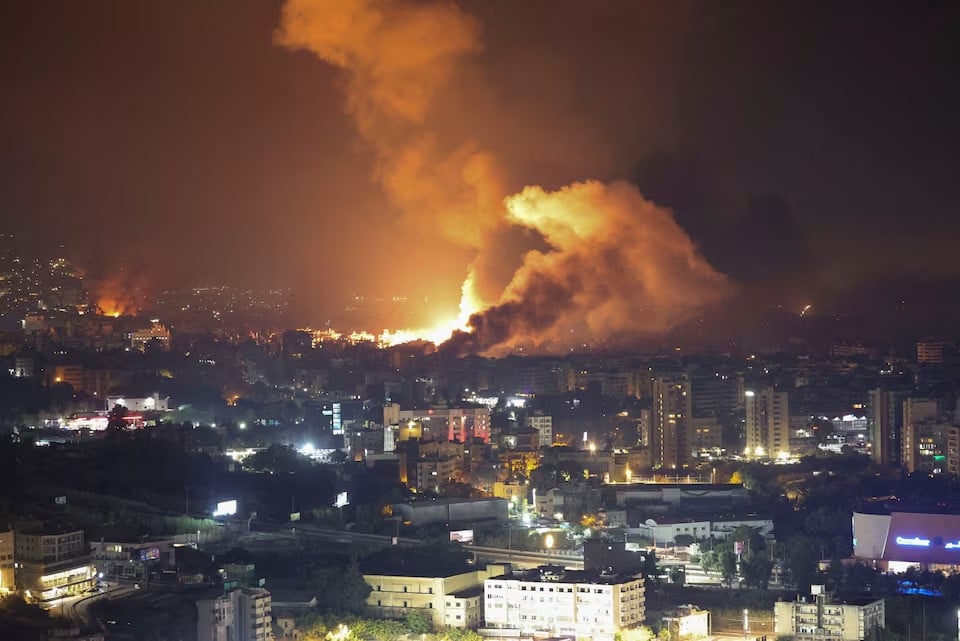
Israel launched a series of air raids on the southern suburbs of Beirut early on Saturday, intensifying its attacks on Hezbollah following a major strike targeting the Iran-backed movement’s command centre, which was believed to have aimed at leader Hassan Nasrallah.
According to Reuters witnesses, more than 20 airstrikes were heard before dawn. Thousands of residents fled their homes in southern Beirut, congregating in central areas of the city, including downtown Beirut and seaside locations.
Sari, a man in his 30s who had fled his suburb following an Israeli evacuation order, said, "They want to destroy Dahiye, they want to destroy all of us." Many of the newly displaced people were seen trying to sleep on rolled-out mats in Beirut’s Martyrs’ Square.
The continuous five-hour bombardment on Saturday came after Friday’s attack, the most powerful assault by Israel on Beirut since its conflict with Hezbollah began nearly a year ago. This escalation significantly raises concerns that the conflict may spiral out of control, potentially involving Iran—Hezbollah’s primary supporter—as well as the United States.
There has been no immediate confirmation of Nasrallah’s status following Friday’s airstrikes. However, a source close to Hezbollah told Reuters that Nasrallah could not be reached, and the group has not yet issued a statement. While Israel has not confirmed whether it specifically targeted Nasrallah, a senior Israeli official said the strikes were directed at senior Hezbollah commanders. The official stated, “It’s too early to say… Sometimes they hide the fact when we succeed.”
A source close to Hezbollah confirmed to Reuters that Nasrallah was alive, and Iran’s Tasnim news agency also reported that he was safe. A senior Iranian security official said that Tehran was verifying his status. Meanwhile, the Israeli military stated that it had killed Muhammad Ali Ismail, Hezbollah’s missile unit commander, and his deputy, Hossein Ahmed Ismail.
Shortly before the latest strikes, Israeli Prime Minister Benjamin Netanyahu addressed the United Nations, stating that Israel has the right to continue its military campaign. He asserted, “As long as Hezbollah chooses the path of war, Israel has no choice, and Israel has every right to remove this threat and return our citizens to their homes safely.” Several delegations walked out as Netanyahu took the stage, and he later shortened his New York trip to return to Israel.
Lebanese health authorities confirmed that the initial attack on Friday resulted in six deaths and 91 injuries. This was the fourth strike on Hezbollah-controlled southern Beirut in a week and the most severe since the 2006 war. Authorities anticipate the death toll will rise further, but there are no confirmed casualty figures from the subsequent attacks. Over the past week, more than 700 people have reportedly been killed in various strikes.
Hezbollah’s al-Manar television reported that seven buildings were destroyed. Security sources indicated that the target was a location frequently used by senior Hezbollah officials. Following the strikes, the Israeli military ordered residents in parts of Beirut’s southern suburbs to evacuate as it targeted missile launchers and weapons storage sites allegedly concealed under civilian housing. Hezbollah denied these claims, stating that no weapons or arms depots were located in the targeted buildings.
Alaa al-Din Saeed, a resident of one of the neighbourhoods identified by Israel, said he was leaving the area with his wife and three children. He told Reuters, “We found out on the television. There was a huge commotion in the neighbourhood.” The family grabbed their clothes, identification papers, and some cash but faced heavy traffic as many others attempted to flee. He added, “We’re going to the mountains. We’ll see how to spend the night – and tomorrow we’ll see what we can do.”
Approximately 100,000 people in Lebanon have been displaced this week alone, raising the total number of displaced individuals in the country to over 200,000. Meanwhile, the Israeli government has stated that returning around 70,000 Israeli evacuees to their homes is a key objective.
The heightened conflict has raised fears that it could spread further. Hezbollah has launched hundreds of rockets and missiles at targets in Israel, including Tel Aviv. The group claimed responsibility for a rocket attack on the northern Israeli city of Safed, where one woman sustained minor injuries. Israel’s air defence systems have so far minimised the damage.
Iran, which stated that Friday’s attack crossed “red lines”, accused Israel of using US-made “bunker-busting” bombs. US Defence Secretary Lloyd Austin clarified that Washington was not informed of the strike beforehand. President Joe Biden has been kept updated on developments.
At the United Nations, where the annual General Assembly convened this week, the escalation prompted expressions of concern. France, alongside the US, has proposed a 21-day ceasefire. French Ambassador Nicolas de Riviere called for an immediate halt to hostilities at a Security Council meeting, stating, “This must be brought to an end immediately.”
During a press conference in New York, US Secretary of State Antony Blinken reiterated, “We believe the way forward is through diplomacy, not conflict… We will continue to work intentionally with all parties to urge them to choose that course.”
1725354252-0/Untitled-design-(5)1725354252-0-405x300.webp)
1732099866-0/adele-(3)1732099866-0-165x106.webp)




1732079997-0/BeFunk_§_]__-(7)1732079997-0.jpg)


1732090878-3/Untitled-design-(22)1732090878-3-270x192.webp)







COMMENTS
Comments are moderated and generally will be posted if they are on-topic and not abusive.
For more information, please see our Comments FAQ